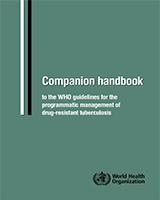Resistance to tuberculosis (TB) drugs is a formidable obstacle to effective TB care and prevention globally. Multidrug-resistant TB (MDR-TB) is multifactorial and fuelled by improper treatment of patients, poor management of supply and quality of drugs, and airborne transmission of bacteria in public places. Case management becomes difficult and the challenge is compounded by catastrophic economic and social costs that patients incur while seeking help and on treatment.
In 2006, MDR-TB strains with additional resistance to second-line drugs were described as extensively drug-resistant TB (XDR-TB) strains, further compromising treatment options available to patients infected with these strains. Since then, clinicians in some settings have reported patients infected with strains in which virtually all treatment options have been exhausted. This rapidly evolving landscape is a clarion call to policy-makers and practitioners to respond with improvements in care delivery and introduction of innovative tools and approaches. In 2009, the 62nd World Health Assembly urged WHO Member States to provide universal access to care for drug-resistant TB patients. In that resolution, it was acknowledged that national TB programme managers, clinicians, nurses, all care providers and affected people themselves need guidance on how best to bring together different elements of health systems and services needed to effectively address the MDR-TB challenge. Therefore, this Handbook has been developed for the purpose of describing ways to implement established WHO policies relevant for the management of MDR-TB. These WHO policy recommendations have been produced using the GRADE methodology for evidence assessment, as adopted by WHO in 2008.
While drug-resistant TB is today a major threat worldwide – and in some settings up to one third of new cases are multidrug-resistant at first diagnosis – it is important to remember that most patients are infected by drug-susceptible strains and can be cured with the standard six-month first-line regimen. Therefore, besides focusing on care for drug-resistant TB, the programmatic management of MDR-TB is premised upon keeping the number of cases with drug resistance to a minimum and treating those that have the condition with the best possible means available.
We trust that you will find this publication useful. WHO will continue working to keep pace with scientific advances in diagnostics, therapeutics and care delivery options so that it can respond effectively and in a timely manner to the needs of TB patients with drug resistance in all countries.
Dr Mario Raviglione
Director
WHO Global TB Programme


